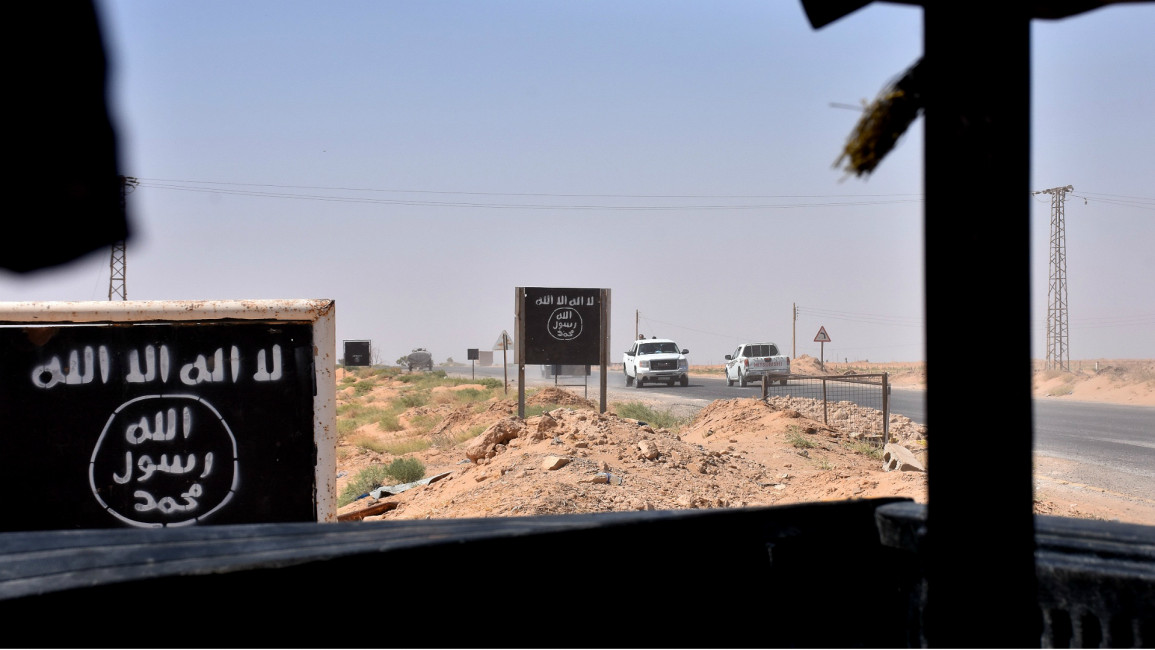IS defeat in Syria 'weeks away', says US defence chief
IS defeat in Syria 'weeks away', says US defence chief
It comes a month after Donald Trump announced the defeat of IS.
2 min read
IS are close to defeat in Syria [Getty]
The Islamic State group's last territories in Syria will fall within weeks, the US defence secretary has said, as the militants fight on to the last hamlets under their control.
"I'd say 99.5 percent plus of the [IS]-controlled territory has been returned to the Syrians. Within a couple of weeks, it’ll be 100 percent," Defence Secretary Patrick Shanahan said.
The Kurdish-Arab Syrian Democratic Forces (SDF) are ramping up their assault on the last farmsteads occupied by IS militants, who are putting up stiff resistance to the US-backed fighters.
US-led coalition planes are heavily bombing the small Hajin pocket held by IS, with militants reporting miserable conditions in the area, with food shortages forcing locals and fighters to live off grass and wheat.
It comes a month after President Donald Trump announced the defeat of IS and ordered American troops to leave Syria - something said to be strongly opposed by his inner-security circle and US allies in the region.
IS have continued to launch counter-attacks and bombings on US and SDF forces in Syria and are feared to be operating sleeper cells in liberated areas.
Shanahan joined Trump in saying that the group's ability to carry out attacks had been "significantly mitigated".
Despite Trump's confidence in the defeat of IS, Director of National Intelligence Dan Coats has said on Tuesday that the group still operates thousands of militants and the organisation poses a huge threat to the US and its allies.
"[IS] still commands thousands of fighters in Iraq and Syria, and it maintains eight branches, more than a dozen networks, and thousands of dispersed supporters around the world, despite significant leadership and territorial losses," Coats said in a new report to Congress.
"The group will exploit any reduction in CT pressure to strengthen its clandestine presence and accelerate rebuilding key capabilities, such as media production and external operations."
He added that the fighters will likely pursue non-conventional attacks on the US and its allies.
"[IS] very likely will continue to pursue external attacks from Iraq and Syria against regional and Western adversaries, including the United States."
IS declared the establishment of a "caliphate" in 2014, occupying huge swathes of land in Syria and Iraq.
The group lost almost all of its territories following a US-led assault on their strongholds, with the urban centres of Mosul and Raqqa falling after a bloody stand-off by the militants.
"I'd say 99.5 percent plus of the [IS]-controlled territory has been returned to the Syrians. Within a couple of weeks, it’ll be 100 percent," Defence Secretary Patrick Shanahan said.
The Kurdish-Arab Syrian Democratic Forces (SDF) are ramping up their assault on the last farmsteads occupied by IS militants, who are putting up stiff resistance to the US-backed fighters.
US-led coalition planes are heavily bombing the small Hajin pocket held by IS, with militants reporting miserable conditions in the area, with food shortages forcing locals and fighters to live off grass and wheat.
It comes a month after President Donald Trump announced the defeat of IS and ordered American troops to leave Syria - something said to be strongly opposed by his inner-security circle and US allies in the region.
IS have continued to launch counter-attacks and bombings on US and SDF forces in Syria and are feared to be operating sleeper cells in liberated areas.
Shanahan joined Trump in saying that the group's ability to carry out attacks had been "significantly mitigated".
Despite Trump's confidence in the defeat of IS, Director of National Intelligence Dan Coats has said on Tuesday that the group still operates thousands of militants and the organisation poses a huge threat to the US and its allies.
"[IS] still commands thousands of fighters in Iraq and Syria, and it maintains eight branches, more than a dozen networks, and thousands of dispersed supporters around the world, despite significant leadership and territorial losses," Coats said in a new report to Congress.
"The group will exploit any reduction in CT pressure to strengthen its clandestine presence and accelerate rebuilding key capabilities, such as media production and external operations."
He added that the fighters will likely pursue non-conventional attacks on the US and its allies.
"[IS] very likely will continue to pursue external attacks from Iraq and Syria against regional and Western adversaries, including the United States."
IS declared the establishment of a "caliphate" in 2014, occupying huge swathes of land in Syria and Iraq.
The group lost almost all of its territories following a US-led assault on their strongholds, with the urban centres of Mosul and Raqqa falling after a bloody stand-off by the militants.



